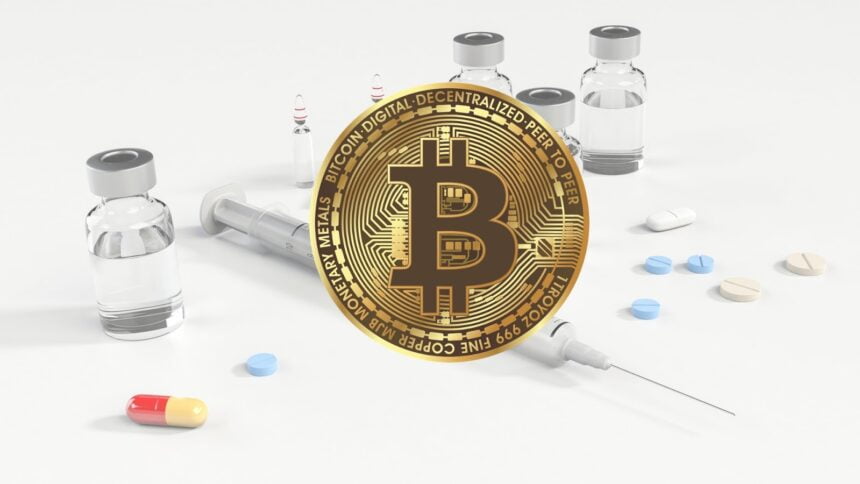The buzz around Blockchain technology has penetrated many different industries. But the way Blockchain technology is playing a massive role in revolutionizing the healthcare supply chain, human genome project, managing health data, and streamlining health insurance claim settlement is quite revolutionary in its scope and possibilities.
Three things that made Blockchain technology so ardently embraced by the healthcare industry need to be known. Blockchain ensures tamper-proof data management through a mutual consent-based unlocking of encryption and prevents any removal or changes to the data.
Secondly, Blockchain establishes complete transparency and allows easy and streamlined access to data at all times. Thirdly, Blockchain decentralized database technology through Smart Contracts simplifies agreements relating to complex processes like health insurance claims.
From the above-shown chart, it is pretty clear that Blockchain adoption by healthcare service providers is constantly on the rise. Thanks to Blockchain, the problem concerning counterfeit drugs and medical supplies could be avoided to a great extent. As the data indicates, Blockchain-based health applications are continuously growing, and they are all set to reach an exponential height by the year 2025.
Around 40% of top health professionals consider blockchain as one of the top 5 important technologies in their list of priorities. The spending on Blockchain on a global scale will touch $5.61 billion by the year 2025. The same report also mentions that blockchain adoption in the healthcare sector can lead to a year-on-year saving of $100-$150 billion until 2025.
With the massive promise of Blockchain technology for the healthcare industry, let’s explore various healthcare solutions and applications shaped by the prowess of Blockchain technology. Understanding these use cases of Blockchain is important before you hire app developers for healthcare app projects.
Securing Patient Data
Safekeeping medical data from all frauds and data breaching attempts is considered the biggest priority for healthcare experts when embracing Blockchain technology. Data security is always a big concern for the entire sector, and in recent years the industry has suffered from the unwanted exposure of millions of patient data. Stealing of financial information and health records makes up the majority of such fraudulent cases.
This is where the decentralized and completely tamper-proof database technology of Blockchain can play an eta defining role. Among the multitude of Blockchain-powered data storage and data management solutions for the healthcare industry, BurstIQ and Fatcom are particularly worth mentioning.
BurstIQ is a blockchain-based solution that allows healthcare providers to securely store and manage vast amounts of patient information while ensuring strict and continuous compliance with HIPAA regulations. Factom, on the other hand, helps to store and manage all digital health records in medical establishments and enforces strict authorization to regulate access to medical data.
Blockchain for Genetic Research
After completing the Human Genome Project, there has been a growing trend among healthcare professionals and researchers to order genome sequencing of people. The price of personal human genome sequencing orders is also decreasing continuously. The genome sequence data market is all set to face explosive demands. No wonder, irrespective of the challenges to building an app from scratch for the human genome database, many companies have already stepped in.
Some companies like Nebula Genomics are now using Blockchain to manage this data and ensure faster securely and streamlined access to genome data by the interested buyers. As orders for personal genome data continue to rise, such Blockchain-powered data management solutions can offer the right solution. This is a big reason that app development is helping change healthcare.
Blockchain for Healthcare Commerce
Healthcare commerce refers to all the purchasing of healthcare products and services and the transactions in healthcare facilities. In terms of market value, healthcare commerce boasts of unparalleled value. Thanks to Blockchain-powered healthcare commerce solutions, transactions can be more secure, and payment data can enjoy better security protection and more streamlined transactions.
PokitDok, by offering an advanced platform-as-a-service (PaaS) platform for healthcare organizations to facilitate commercial transactions across facilities, has already made its niche reputation. Now over the last few years PokitDok incorporated a Blockchain based transaction network called DokChain. The new solution ensured more security and streamlined performance for several healthcare applications like EHR, identity verification, start contracts, automatic adjudication, etc.
Blockchain for Healthcare Supply Chain
The Healthcare industry frequently faces the challenges of authenticating medical goods, drugs, and other medical supplies. The challenge is serious because of the adverse impact counterfeit products and materials can take in the healthcare industry. This is where Blockchain-based tracking of items in the supply chain down to the source can lay bare the authenticity of all medical goods and commodities. Thanks to Blockchain, customers can have comprehensive visibility of all the goods in the medical supply chain.
Stopping the marketing of counterfeit goods remains a topmost priority for the healthcare industry, which is particularly true for developing countries where counterfeit drugs and medical supplies caused millions of deaths. On the other hand, there is a continuous demand for remote health monitoring to ensure efficiency. For both contexts, Blockchain supported medical databases and supply chain tracking solutions seem to be ideal.
MediLedger has emerged as a great application to unleash the benefits of Blockchain protocol to help companies track the authenticity of the supplies and drugs in the medical supply chain. The solution streamlines authenticating the drugs along with their expiry dates.
Gaining customer confidence by ensuring the authenticity of the drugs and supplies is a significant gain that Blockchain-powered applications such as MediLedger offers to healthcare establishments. Another important advantage that MediLedger and similar Blockchain-powered healthcare applications provide is strictly adhering to compliance.
Another Blockchain-based application called FarmaTrust can even send automatic notifications corresponding to law enforcement violations and other issues. On top of all these, these Blockchain-powered healthcare applications can also augment demand and supply balance based on precise data-driven predictions.
Blockchain-powered Smart Contracts for Health Insurance Settlements
Another primary Blockchain application concerns the health insurance settlement. Since tracking medical and patient data up to minute details is of great significance in settling health insurance claims faster, Blockchain distributed database systems can play a significant role in preventing frauds related to health insurance and streamlining the entire process. Leveraging the value of bitcoin along with the security provided during digital transactions, is a great solution for insurance settlements.
We already have established healthcare Blockchain solution providers such as Chronicled and Curisium that allow all types of stakeholders in the medical system, including medicine brands, device manufacturers, medical facilities, insurance companies, wholesalers, and suppliers can establish authentications, provide all contact details and monitor all types of transactions. Such systems facilitate the complete digitization of healthcare systems while ensuring streamlined processes and data security.
Thanks to the sharing of digital contracts among various stakeholders such as healthcare companies, manufacturers, distributors, and suppliers, disputes over transactions can be significantly minimized, and claims can be settled faster. Just because the pricing of medical goods and supplies is extremely volatile and subject to market demands and other factors, chargeback claims are frequent in the entire healthcare sector. Many of these claims require time-consuming manual resolution. This is where smart contracts can play a significant role by putting every e on the same page.
At the same time, the shared intelligent contracts are helpful to handle medical insurance agreements more efficiently. There is at least 10% of all medical claims belong to this category of dispute. By digitizing this healthcare data, more advanced analytics can improve the quality of healthcare and cost.
Conclusion
All the different applications and use cases of Blockchain in the healthcare sector have one thing in common; they ensure better trust-building among all stakeholders through real-time monitoring and power data-driven automation. In the years to come, Blockchain-powered solutions will continue to create more value for healthcare applications.







